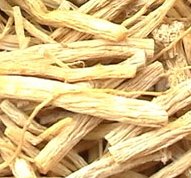Dang Shen

  | Dang Shen in TCM:Explore the properties of Dang Shen according to Chinese
Nutrition and Traditional Chinese Medicine (TCM):
Factoids:
English Name: codonopsis, pilose Asia bell root
Pharmacuetical Name: Radix Codonopsis
Properties: sweet, neutral
Temperature: neutral
Channels: LU, SP
Flavors: sweet
Tonifies: qi, blood
Actions / Indications:
- Tonifies the SP; augments qi (fatigue, tired limbs,
appetite loss, diarrhea, vomit, chronic illness with SP qi deficiency;
in combination for qi sinking with organ prolapse)
- Tonifies LU qi (LU qi deficiency causing chronic
cough, shortness of breath, weak voice)
- Tonifies q and generates fluids and blood ( thirst
due to injury of fluids; wasting and thirsting disorder; pale complexion,
dizziness, palpitations due to qi and blood deficiency)
- Supports anti-pathogenic qi to expel pathogens (constipation
with significant qi deficiency or exterior syndromes)
Special Notes:
- (note: Dang Shen is often used as a subsititute for ren shen at larger
doses, but not for qi collapse)
- (note: compare with Huang Qi)
- Pharmacologically Dang Shen is a powerful adaptogenic herb that has
both a stimulating and inhibiting effect on the central nervous system.
It has been shown the help animals adapt to stress.
- A decoction of Dang Shen at varying doses ranging from 50 to 250g was shown to help with gastric ulcers.
Disclaimer: In accordance with our terms of service, by using this web site you agree that none of the information found on this web site constitutes medical advice. You should always consult your doctor before trying any particular food or herbal remedy to treat disease.
Folk remedies presented on this site are designed to address specifc TCM diagnoses, and are not one-size-fits-all. If you would like to learn more about Traditional Chinese Medicine (TCM) and how it relates to Chinese Nutrition, you can book in a free call with a licensed professional. There is no obligation to purchase.
[CLICK HERE for your free INITIAL CONSULTATION] |

